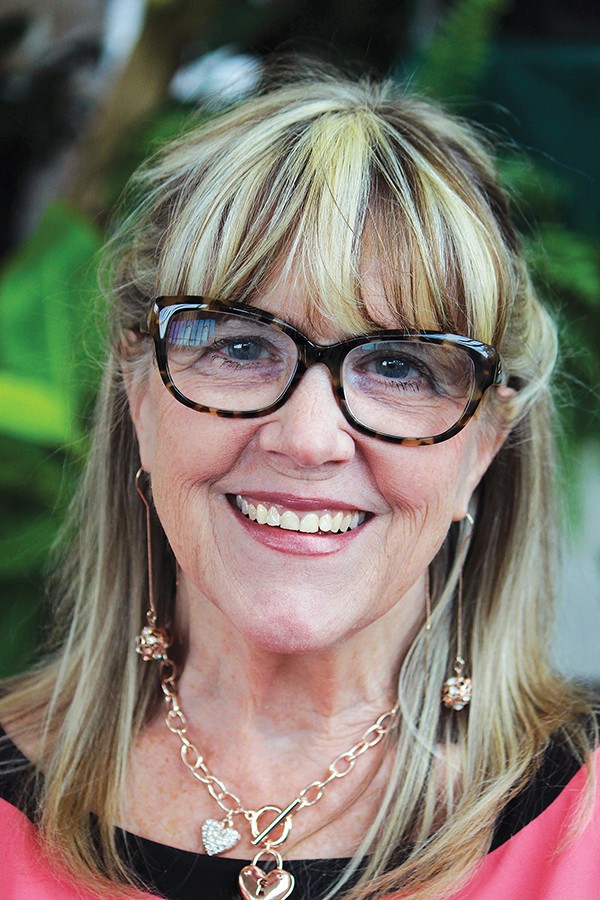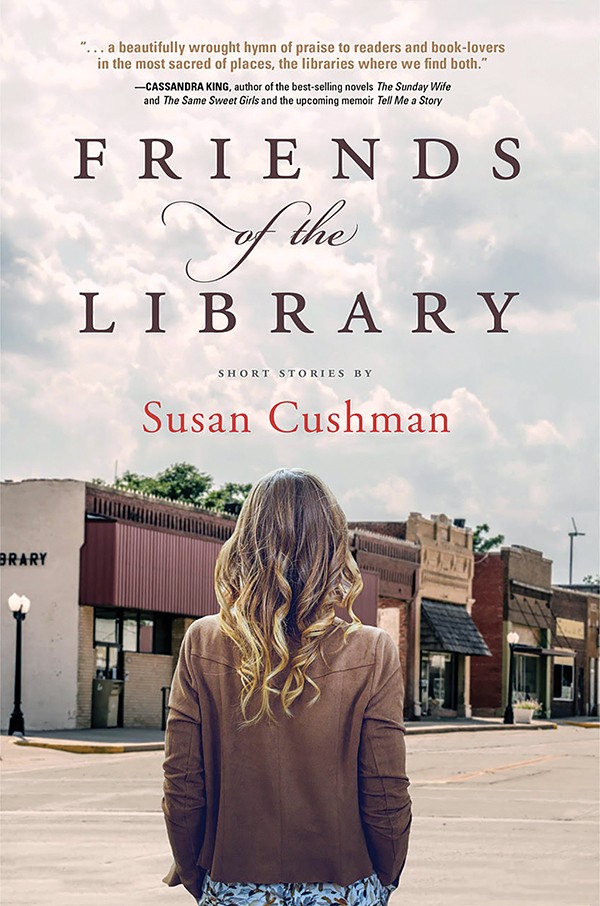It was one of those disconcerting moments where the reality you’ve accepted for years seems to evaporate in the blink of an eye. In the first week of June, after tending to my weekly routine of setting out waste bins for collection, I saw a garbage truck pull up, two workers roll my recycling and standard waste carts to the truck, then dump them both in. I was dumbfounded.
Most of us expect that by following the correct protocols, our waste and recycling will seamlessly feed into a system that takes it from there. Now the system was apparently broken. The variety of responses to what I’d witnessed revealed what a black box the process is to most of us. Some friends I talked to shrugged and claimed that all recycling was bogus; others expressed outrage mixed with impotency — that familiar feeling of the disempowered citizen trying to do the right thing. Very few friends and colleagues, however, could explain the recycling process in any detail.
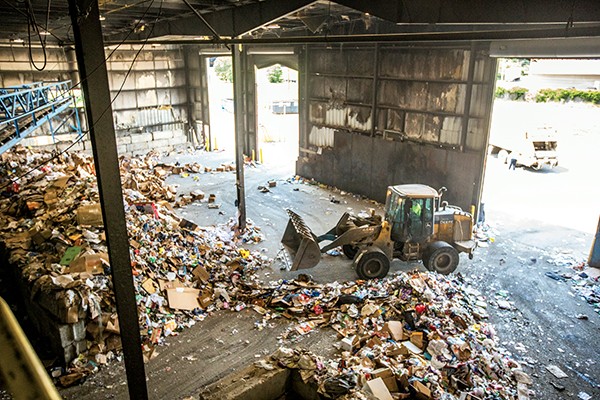 Photographs by Justin Fox Burks
Photographs by Justin Fox Burks
The Materials Recovery Facility off Lamar.
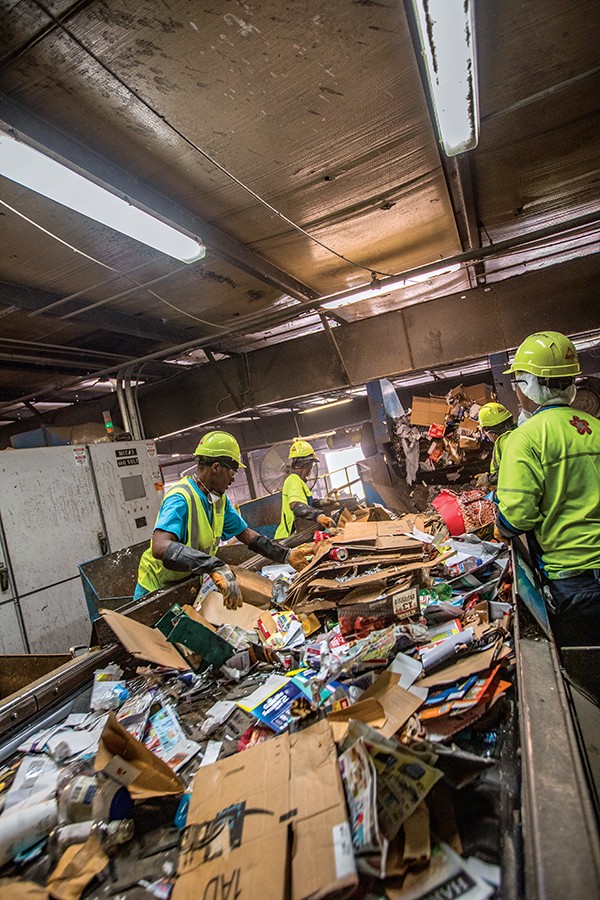
As it turned out, there had been a fire that week at the main materials recovery facility (MRF) that processes recyclables for the city of Memphis and other municipalities. Located near American Way and Lamar Avenue and operated by Republic Services, the facility is the country’s second-most profitable waste-processing outfit.
“The fire occured on a Friday afternoon,” Memphis’ solid waste deputy director Philip Davis tells me. “The facility was back and running the next Thursday. At that time, we had to divert materials to the landfill because there wasn’t storage capacity for the recyclables. So that was unfortunate, but the silver lining was that it wasn’t a catastrophic fire that shut the facility down for an extended period of time.”
Solid waste director Albert Lamar agrees. “The cause of the fire was undetermined,” he says, adding that, due to the fire, “about 235 tons of recyclables ended up in the landfill” that week. This roughly lines up with last year’s annual total of 15,600 tons, or 300 tons per week, delivered to the MRF by the city. Yet even when fire does not shut down the MRF, more than 20 percent of what is delivered there — 60 tons per week — will not be recycled.
Bearing that in mind, phenomena such as the 1.6-million-square-kilometer expanse of plastic waste in the Pacific Ocean, aka The Great Pacific Garbage Patch, make more sense. “Well, I’m doing my part,” you might think when reading such news, not knowing how much of your recycled plastic and other waste simply goes to a landfill, despite your best efforts.
The waste-management system wasn’t always so marked by inefficiency. But it is today, due to a perfect storm of events. And they’re just the tip of the garbage patch.
Years ago, the recycle market was such that municipalities would actually receive revenues from the processor for the sale of recycleable material,” says Joe Nunes, neighborhood services manager for the City of Germantown and chair of the Shelby County Solid Waste Advisory Board. “But in recent years, National Sword in China and other initiatives have dramatically impacted the market for recyclables in the entire country. The biggest issue in the industry right now is contamination. China limited the percentage of contaminated material that they would accept, and that percentage was not achievable by most U.S. recycling facilities.”
The Chinese National Sword policy that took effect on January 1, 2018, served more like a national shield, blocking the torrent of heavily contaminated recyclables that China once received to a mere trickle. Suddenly, China would only accept recyclables with a contamination rate of 0.5 percent or better, after decades of looser contamination standards, when the country established itself as a leading importer of recyclables to feed its rapidly expanding economy. With the resale market radically shrinking, other buyers of recycled waste have become more stringent as well. Meanwhile, Memphis’ own recyclables contamination rates reach as high as 21 percent.
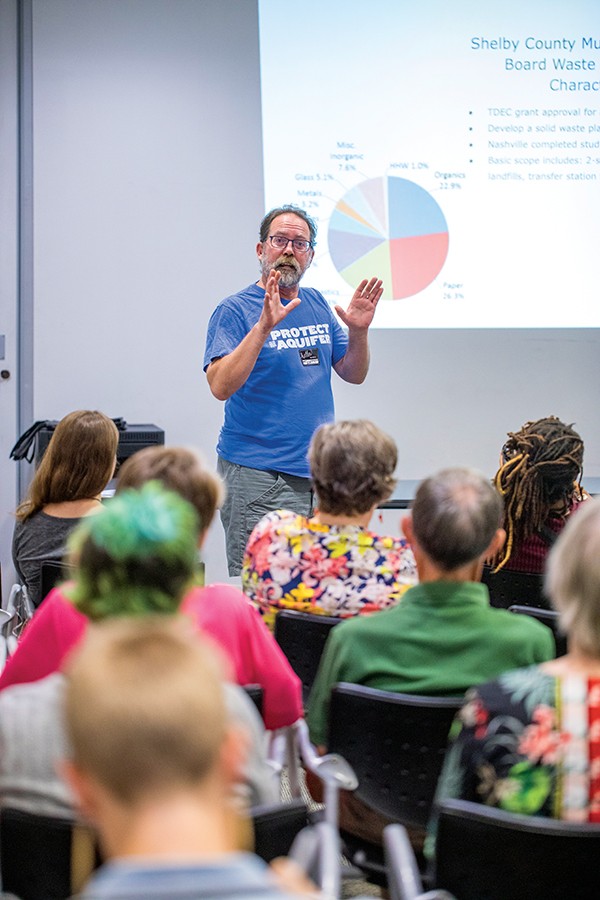
Scott Banbury presents hard facts on the recycling industry to the Sierra Club.
We may simply have to face the fact that there is a global garbage glut, especially of the plastic variety.
“Plastic Recycling is a Myth” is the title of a recent article in the Guardian. It details horror stories of a vast underworld of waste mismanagement, with unregulated landfills in Thailand, Indonesia, and Vietnam accepting millions of tons of mostly plastic waste. The bottom line? There is simply too much plastic for the world to manage.
Only 9 percent of the world’s produced virgin plastic has been recycled, according to the Guardian. While the scrap metal, aluminum, and cardboard recycling markets have not sunk completely, the market for plastics is essentially gone. “The price of plastics has plummeted to the extent that it isn’t worth recycling. If China doesn’t take plastic, we can’t sell it,” said one British recycler.
The shrinking of the recyclables market is having dire effects well beyond your curbside pick up. As reported earlier this year by WKNO’s Katie Riordan, Republic Services no longer accepts any recycling waste from Memphis International Airport, St. Jude Children’s Research Hospital, or the University of Memphis. And, as we go to press, the city of Jackson, Mississippi, has canceled all of its recycling programs, indefinitely.
When curbside recycling began, as most will remember, items were separated more or less by material: the glass set apart from paper, set apart from cans, and so on. This all changed in the early years of this decade, with the advent of single-stream systems. It started in Memphis in 2014, with the rollout of new recycling mega-carts that held 96 gallons, with no separation required. Single-stream systems took all the sorting responsibilities away from the consumer and pushed it further down the pipeline. And, with household-level separation abandoned, contamination shot up. Joy Williams, then the recycling coordinator for the city of Memphis, told the Wastedive website in 2017 that single-stream had raised contamination rates from 2 percent to 16 percent. And it’s been climbing since then.
Yet Lamar and Davis remain committed to single-stream, and it’s easy to see why: volume. “We rolled single-stream out in the Cordova and Hickory Hill areas in 2014,” says Davis. “And we saw a tremendous increase in volume, literally overnight. Like, one week we had 18-gallon bins, the next week we had 96-gallon carts — 200 percent increase. Just like that. It became apparent that people recycle until the container’s full. So that encouraged us to seek outside funding with Closed Loop Fund and the Recycling Partnership and make a significant investment in these 96-gallon carts. And it took us probably a year and a half to get those carts rolled out citywide.”
Davis sees single-stream as more inclusive. “You have to make recycling available to everyone,” he says. “It’s about accessibility. Single-stream makes recycling accessible to a broader population.”
For the city’s Department of Solid Waste, it’s primarily an education issue. “We just have to be smarter,” says Lamar. “In the Memphis curbside collection now, we’ve got a Know Where to Throw campaign. We have a recycling game and so forth. They can go on the Memphis Curbside Collections app, type in the item that you’re thinking about recycling, and it’ll tell you if that item is recyclable in the Memphis system. The bottom line is that, across the nation, we have to teach the consumer to be smarter about recycling. No longer are the days in which we can just throw plastics, paper products, and so forth in there and expect that it is going to be recyclable. We have to get much better and more detailed about the way we do it, so we can reduce the contamination.”
A narrow focus on primarily changing consumer behavior, of course, bears all the signs of free-market fundamentalism, the sea in which most municipal departments swim these days. But there’s a sea change as well. Call it the environmental imperative, which even the most die-hard free-marketers acknowledge. As Nunes notes to me, in words echoed by Memphis city officials and others: “The thing about recycling is that we’ve got to not only look at the economic side of it, but also the environmental side and the social side. If we look at long-term sustainability, our goal should still be to keep material out of the landfill.”
That simple idea — keeping material out of the landfill — is in fact the explicit goal of a group some may not associate with environmental activism: the Teamsters Union. Supporters of workers’ rights over a broad spectrum, the union, it turns out, has been grappling with recycling issues for some time. A 2015 study by the Partnership for Working Families, the National Council for Occupational Safety and Health, and others, begins with the bold words: Zero waste is the future.
It’s a natural extension of a concern for workplace safety, according to Matt Brown, who works for the strategic research and campaigns department, waste division, of the International Brotherhood of Teamsters. “The Teamsters are helping the city adopt a more green program that would not only get us to a zero-waste goal, but also protect workers who do that,” he says. “As a native Memphian and a trade unionist, waste workers have a special place in my heart. Dr. King was assassinated protecting waste workers. And waste remains the fifth-most dangerous job in America. A lot of guys get hepatitis or other diseases because when they’re pulling bags of trash, they’re getting stuck by needles. Or people throw away ammunition that explodes. Workers at recycling centers are in even more danger because you’re having to reach into to these machines. It’s a dangerous gig.”
Staying unionized in the free-market dystopia of the recycling world isn’t easy. “It’s thanks to the fight that the men went through to build their union,” says Brown. “We just organized Waste Management in the last five years. And they [Republic] ran a very vicious anti-union campaign. Regarding the Republic contract, we had strikes six or seven years ago, for two or three weeks, to hold on to our standards. These are multinational corporations with almost endless pockets.”
And unionization dramatically affects how recycling is actually practiced. “One guy was fired when his supervisor came over the dispatch radio and said, ‘They missed the recycling, go back and put it in your truck.’ And he said, ‘No, we’re a garbage truck, not a recycling truck.’ The supervisor said, ‘I don’t care, go back there.’ Then a resident of Germantown videotaped him comingling garbage and recycling. So guess what, even though he was directly told by management to do it, they fired him. If that man had had a union, he could have said, no, it’s against my contract to comingle.”
To gain a little perspective on this international web of marketing and finance, comingling cheesy pizza boxes, National Swords, and deadly medical sharps, I went to a special meeting on recycling hosted by the Chickasaw Group of the Sierra Club last week. And there, at last, was a vantage from which you could see past the hills of rubbish.
A presentation by members Scott Banbury and Nancy Chung walked attendees through the current state of market-driven recycling, its wider context, and the many alternatives. But, unlike some explanations I’d received for the current recycling predicament, this narrative included a larger, industry-driven context. The future, according to some, is in plastics.
“The petrochemical industry wants a new market to replace any revenues they lose from people switching to electric cars,” Banbury said. “These are cars that no longer need motor oil. They no longer have to have a bunch of chemicals that get put under our hoods. And they realize that, as electric cars are adopted, their market’s going to decline. They want to replace that declining market, with making new plastic.”
At the meeting, Banbury outlined the industry’s future vision. As the Great Pacific Garbage Patch continues to grow, and the global market for recycled plastic shrinks to nil, what do we need? More plastic. He refers us to the Center for International Environmental Law (CIEL), which writes that “The infrastructure to produce new plastics is growing rapidly. Massive investments in new plastics infrastructure rest on two critical, but as yet unquestioned, assumptions: 1) that demand will increase continuously and 2) that supplies of cheap feedstocks will remain available for decades.”
Those cheap feedstocks include a new market for that unrecyclable plastic. “New industries are popping up that want to take the plastics that we’re recycling and send them to facilities that heat the plastic up, using energy that is gonna have a Greenhouse impact, and break the plastic back down into the waxes, monomers, and fuel oil,” says Banbury. These processes skirt existing waste incineration laws and dovetail with efforts to harvest more plastics-related chemicals from byproducts of fracking.
In sharp contrast, the spirit at the Sierra Club meeting was one of imagining more open futures, where any and all ideas were welcome. In a discussion that would have delighted Lamar and Davis, there was much brainstorming on how to educate Memphians about recycling smarter. There were anecdotes of apartment complex residents who had, on their own initiative, cut their garbage output and contracted privately to have their recycling picked up. There were testimonials about the wonders of the Compost Fairy, a local organization promoting composting as a way to reduce landfill waste from households, businesses, and communities.
For the first time since I’d been shocked into action by the sight of workers comingling my garbage and recycling bins, I saw a way out. Digging into the world of international recycling markets had set off warning bells more deafening than smoke alarms at a recycling plant. Somehow that simple act had led me to the knowledge that our waste and recycling process has reached a crisis point. I felt in the meeting room a shared motivation to act, perhaps best summed up by Banbury, who took a step back to reflect and said, “You’ve got to understand, we’re just scraping and sucking Mother Earth dry. She’s bleeding all over the place. And we just keep craving more of it.”
To learn more about best recycling practices, visit the city’s waste-management and recycling section on memphistn.gov.
 Gints Ivuskans | Dreamstime.com
Gints Ivuskans | Dreamstime.com  Jon W. Sparks
Jon W. Sparks  Michael Donahue
Michael Donahue  Michael Donahue
Michael Donahue  Michael Donahue
Michael Donahue  Michael Donahue
Michael Donahue  Michael Donahue
Michael Donahue  Michael Donahue
Michael Donahue  Michael Donahue
Michael Donahue  Michael Donahue
Michael Donahue 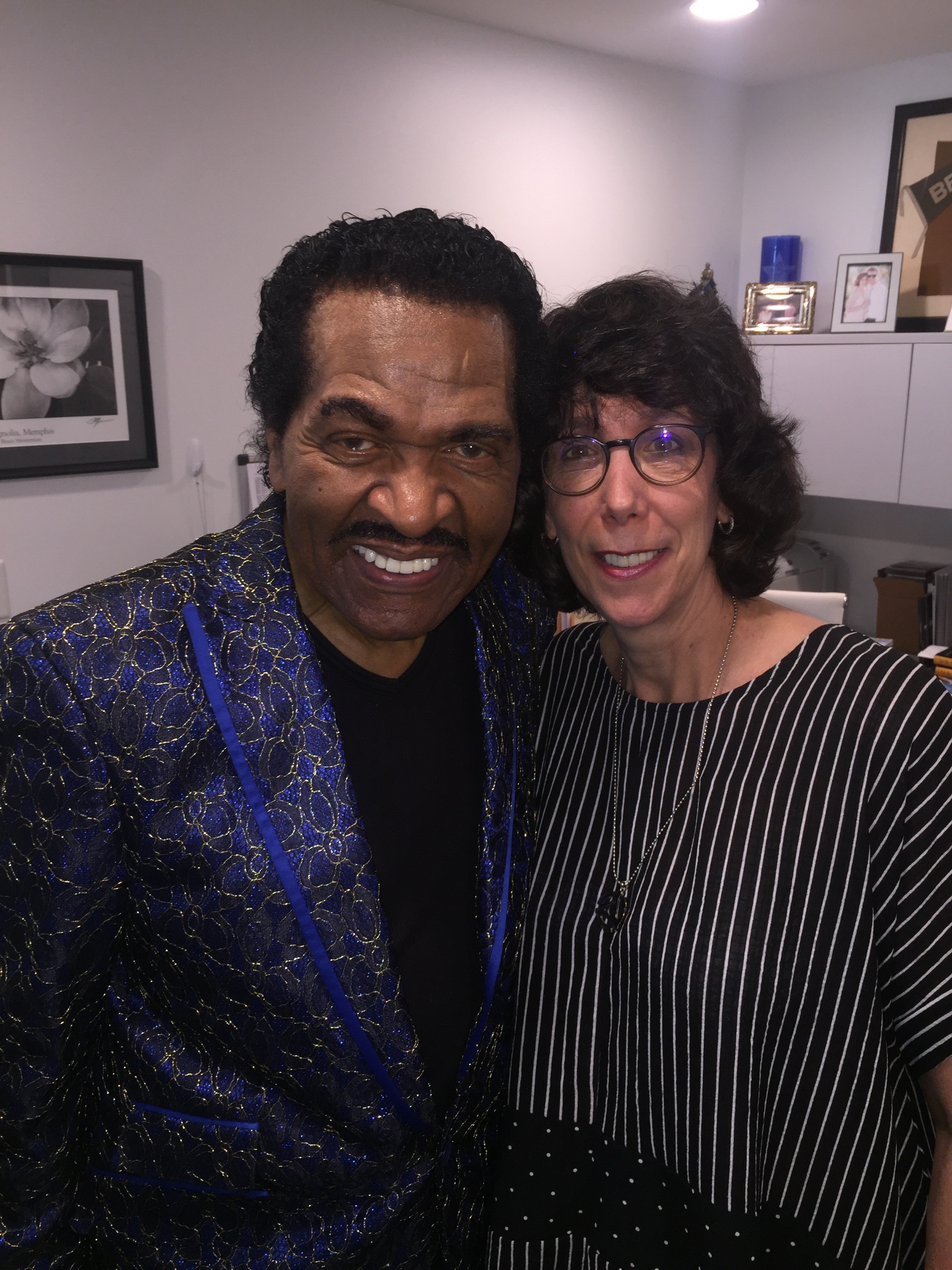 Michael Donahue
Michael Donahue  Michael Donahue
Michael Donahue 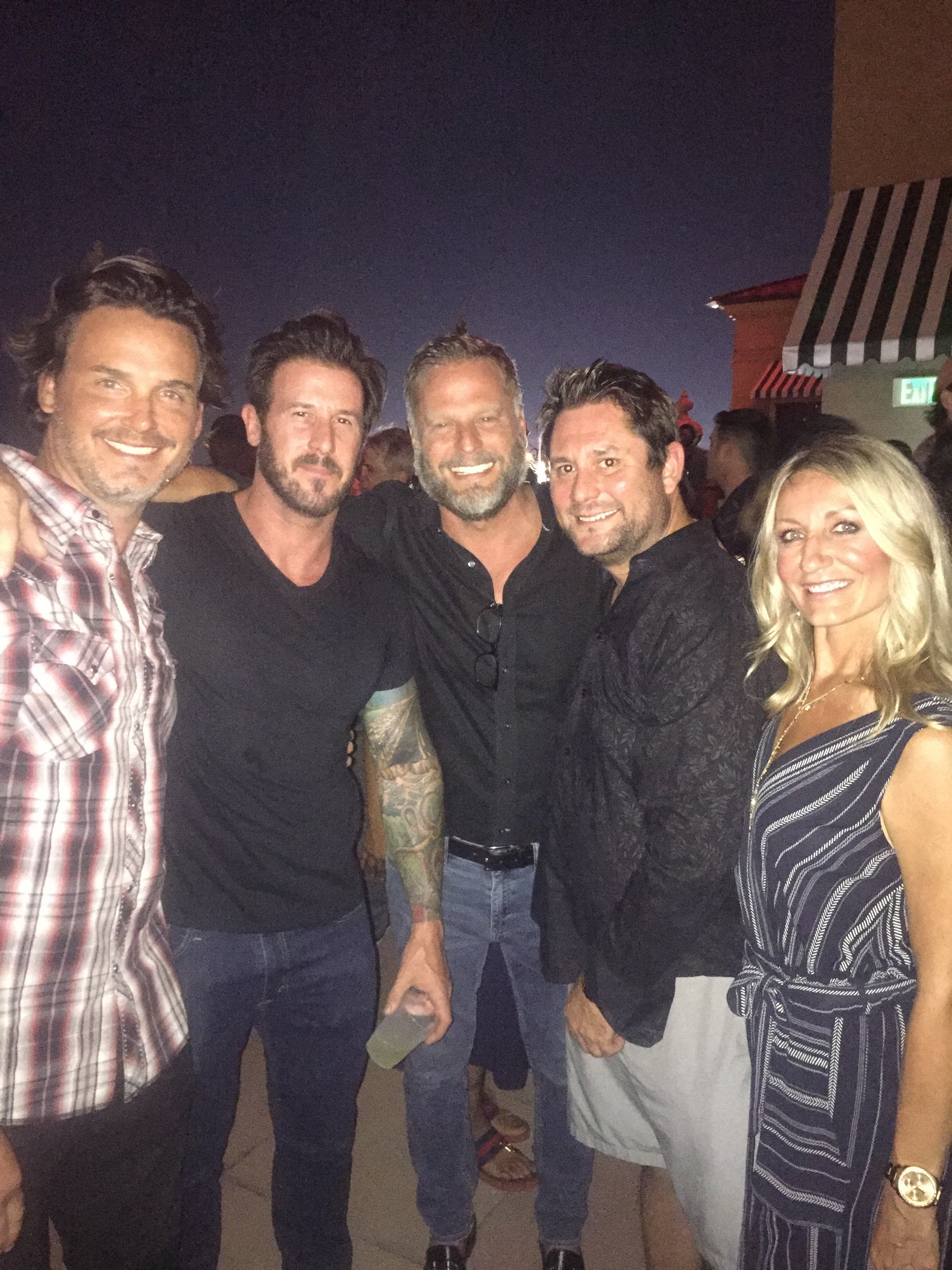 Michael Donahue
Michael Donahue  MIchael Donahue
MIchael Donahue  Michael Donahue
Michael Donahue  Michael Donahue
Michael Donahue  MIchael Donahue
MIchael Donahue  Michael Donahue
Michael Donahue  Michael Donahue
Michael Donahue 
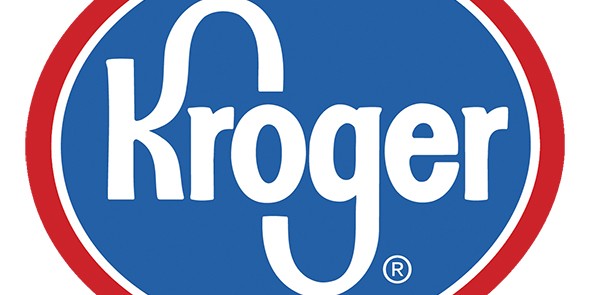
 Charles Nardi
Charles Nardi  Photographs by Justin Fox Burks
Photographs by Justin Fox Burks 

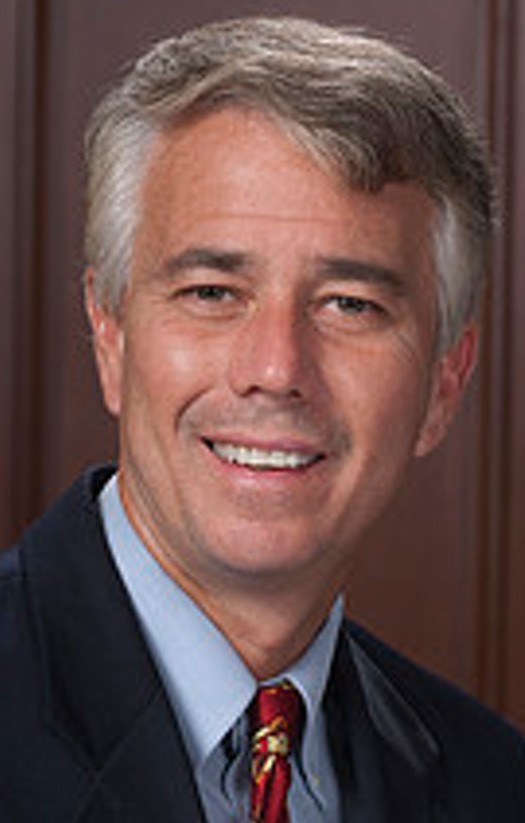
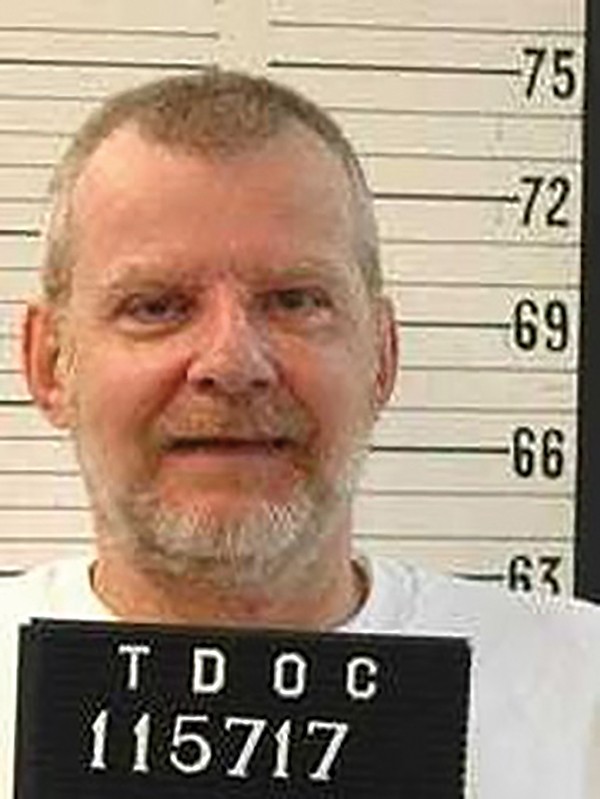 Death Penalty Information Center
Death Penalty Information Center 
